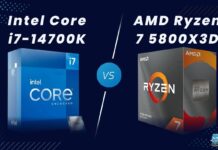AMD’s first chip employing a vertically stacked L3 cache, the Ryzen 7 5800X3D, was an unexpected blow to Intel’s Alder Lake chips. Today, we compare the Ryzen 7 5800X3D vs Core i9-12900KS to see which CPU is better for your rig.
Key Takeaways
- The Core i9-12900KS is just 1.8% faster than the Ryzen 7 5800X3D in 1080P gaming.
- In terms of power consumption, the Ryzen 7 5800X3D proved to be 25.6% more power efficient than the i9-12900KS.
- The Ryzen 7 5800X3D is 8.3% more thermally efficient than its Alder Lake rival, averaging just 60°C across the 1080P gaming benchmarks.
- Looking at the costs, the Ryzen 7 5800X3D is at least 27% cheaper than the i9-12900KS and will also save you money in the long term as it’s more power efficient.
Ryzen 7 5800X3D Vs i9-12900KS: Specifications Comparison
| CPU | Core i9-12900KS | Ryzen 7 5800X3D |
|---|---|---|
| Architecture | Hybrid Core | Zen 4 |
| Codename | Alder Lake | Vermeer |
| Processing Node | Intel 7 (10nm) | TSMC 7nm |
| Socket | LGA1700 | AM4 |
| Supporting Chipsets | Intel 600 Series Intel 700 Series |
AMD 300 Series AMD 400 Series AMD 500 Series |
| No. of Cores | 16 (8P, 8E) | 8 |
| No. of Threads | 24 (2 per P-core, 1 per E-core) | 16 |
| Base Clock | 3.40 GHz (P cores) 2.50 GHz (E cores) |
3.4 GHz |
| Boost Clock | 5.20 GHz (P cores) 4.0 GHz (E cores) |
4.5 GHz |
| L2 Cache | 14MB | 4MB |
| L3 Cache | 30MB | 96MB |
| Memory Support | DDR4 (up to 3200 MT/s) DDR5 (up to 4800 MT/s) |
DDR4 (up to 3200 MT/s) |
| Integrated Graphics | Yes | No |
| Max Operating Temperature | 90°C | 90°C |
| Base Power | 150 watts | 105 watts |
| Boost Power | 251 watts | N/A |
| Launch MSRP (Current MSRP) | $819-$829 ($419) | $449 ($329) |
| Launch Date (Approximate) | Q1’2022 | Q2’2022 |
| Best CPU Coolers | Best CPU Coolers for Core i9-12900KS | Best CPU Coolers for Ryzen 7 5800X3D |
| Best Motherboard | Best Motherboards for Core i9-12900KS | Best Motherboards for Ryzen 7 5800X3D |
| Best RAM | – | Best RAM for Ryzen 7 5800X3D |
Now let’s discuss the key differences between the two CPUs regarding specifications.
Core Design
The i9-12900KS uses the same monolithic (single die) design. However, the CPU boasts Intel’s new Hybrid Core architecture. The primary feature of this architecture is the introduction of new power-efficient “E cores.” Thus, this design has two cores: the full-power P cores and the power-economic E cores. Both the cores are based on different microarchitectures, hence the name “Hybrid Core.”
AMD’s Ryzen 7 5800X3D has a chiplet design, also called a multi-chip module (MCM) design. Although, the Zen 3 architecture removes the idea of the 4-core chiplet and instead lets the L3 cache be shared among a single 8-core chiplet or Core Complex. Also, the extra L3 cache on the Ryzen chip is vertically stacked, unlike the i9-12900KS, in which it’s part of the single monolithic die.
Processing Node
The Core i9-12900KS uses Intel’s custom node called Intel 7, which is a 10nm node – this was previously called 10ESF. While on paper, this is a 10nm node, it competes with TSMC’s 7nm node in terms of transistor density. This brings us to the Ryzen 7 CPU.
Also Read: Ryzen 7 5800X3D Vs. i5-13600K
The Ryzen 7 5800X3D uses TSMC’s node 7nm mentioned above, but as mentioned, the transistor density is similar. So the Ryzen 7 5800X3D has no advantage regarding the processing node.
Socket
The Ryzen 7 5800X3D uses the AM4, a PGA socket (the pins are located on the motherboard). It’s, in fact, the last AMD CPU to be based on the AM4 socket.
Conversely, the Core i9-12900KS uses the LGA1700 socket, on which the pins are located on the CPU itself. The number 1700 refers to the number of pins on the CPU.
Core And Thread Counts
Both the CPUs are similar in terms of the number of full-power cores, which is 8. However, the Core i9-12900KS employs 8 extra E-cores. These are power-efficient cores without hyperthreading support.
Thus, the i9-12900KS features 16 cores with 24 threads, while AMD’s Ryzen 7 5800X3D is limited to 8 cores and 16 threads.
L2 And L3 Cache
Another major difference between the two CPUs is their L2 and L3 cache counts. Regarding the L2 cache, the Core i9-12900KS has 16MB of it, while the Ryzen 7 5800X3D only has 4MB. However, the Ryzen 7 5800X3D bests the i9-12900KS with its massive 96MB of L3 cache – the Core i9 CPU only has 30MB.
Memory Support
Intel’s Core i9-12900KS supports both DDR4 (up to 3200 MT/s) and DDR5 (up to 4800 MT/s). The Ryzen 7 5800X3D is limited to DDR4 support only.
This may pose a concern for the Ryzen 7 5800X3D in certain applications, but in most cases, there is little performance difference between DDR4 and DDR5.
Integrated Graphics
The i9-12900KS has built-in Intel UHD 770 graphics. On the contrary, the Ryzen 7 5800X3D does not have integrated graphics and requires a dedicated graphics card for display.
TDP Rating
The Ryzen 7 5800X3D is rated at a modest 105 watts of TDP at base clocks. Its Intel rival, i9-12900KS, is rated at 150 watts, nearly 43% higher. The i9-12900KS also has a boost TDP rating (the maximum power the CPU will draw with Intel’s Turbo Boost feature). This feature can take the i9-12900KS to a massive 251 watts of power consumption.
Core i9-12900KS Vs Ryzen 7 5800X3D: Gaming Benchmarks
Let’s compare the gaming performance of the two graphics cards. We’ll look at their performance across 7 games, all tested at 1080P resolution and ultra (or equivalent preset). A look at the test benches:
Test Benches
Core i9-12900KS
- Motherboard: Gigabyte Z690 AORUS ULTRA
- Memory: Corsair Dominator Platinum RGB 32GB (2×16) DDR5 6000MHz
Ryzen 7 5800X3D
- Motherboard: Asus ROG Strix X570-E Gaming WiFi – DDR4
- Memory: G.Skill Trident Z 32GB (2×16) DDR4 4000MHz
Shared Components
- CPU Cooler: Corsair iCue H150I Elite
- Graphics Card: Asus TUF Gaming RTX 4090 24GB
- SSD: Samsung 980 PRO 2TB PCIe 4.0 NVMe M.2
- Hard Drive: WD Blue 4TB 7200RPM
- Operating System: Windows 10 PRO
- Power Supply: Corsair RM1000X 1000 Watts
It’s important to note that the Core i9-12900KS is being tested on DDR5 memory with faster frequency while the Ryzen 7 5800X3D is with DDR4 memory clocked at 4000 MHz. So the Core i9-12900KS may have an advantage in some games.
Now, without any further due, lets dive into Core i9-12900KS vs Ryzen 7 5800X3D gaming benchmarks.
Also Check: Ryzen 7 5800X3D Vs Ryzen 7 7700X [Benchmarks]
Cyberpunk 2077
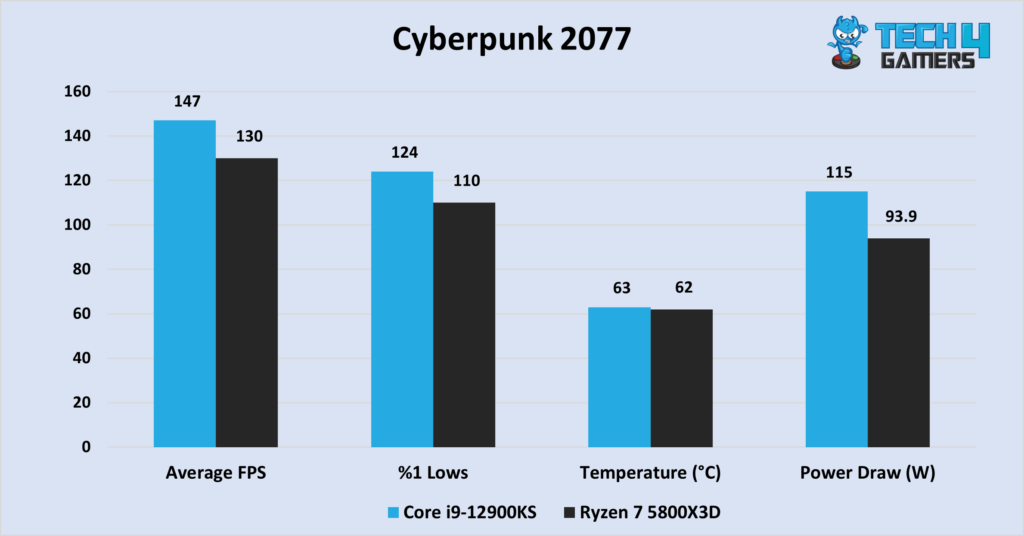
- The i9-12900KS starts with an average of 147 FPS in Cyberpunk 2077. The Ryzen 7 5800X3D trails with 130 FPS – a 13% difference.
- Looking at the %1 lows, the i9-12900KS recorded 124 FPS, and the Ryzen 7 5800X3D scores 110 FPS.
- The Ryzen 7 5800X3D runs a degree cooler than the i9-12900KS, at 63°C.
- The i9-12900Ks drew much more power than its AMD competitor here, at 115 watts. The Ryzen 7 5800X3D draws 93.9 watts in reply.
Hitman 3
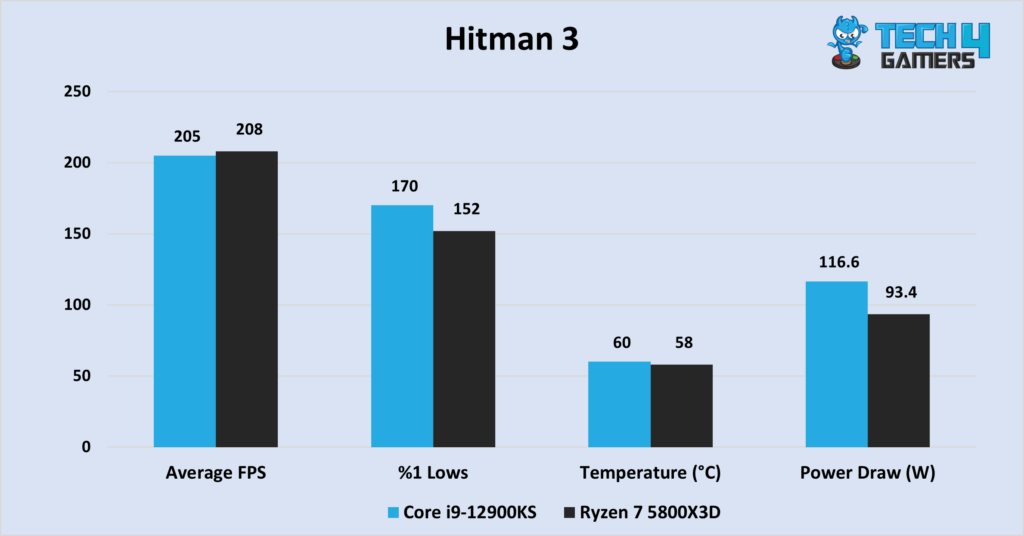
- The Ryzen 7 5800X3D takes the lead here with 208 FPS on average, compared to i9-12900KS’s score of 205 FPS.
- Things take a turn in the %1 low figures. The i9-12900KS scores 170 FPS, while the Ryzen 7 5800X3D trails by 11.8%.
- Both CPUs run quite cool. The i9-12900KS runs at 60°C while the Ryzen 7 5800X3D hovers around the 58°C mark.
- Power consumption is a concern for the i9-12900KS as it draws around 116.6 watts of power. On the other hand, the Ryzen 7 5800X3D uses 93.4 watts of power.
God of War
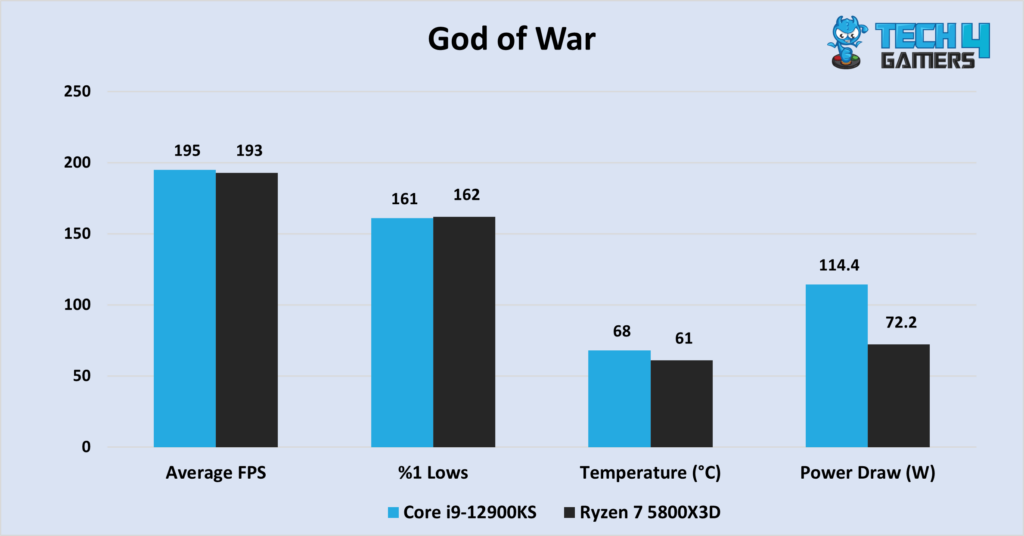
- In God of War, the two CPUs are neck and neck again. The Core i9-12900KS averages 195 FPS, while AMD’s Ryzen 7 5800X3D averages 193 FPS.
- In terms of the %1 lows, the Ryzen 7 5800X3D betters its Intel rival by just 1 FPS.
- The i9-12900KS runs much warmer again, running at around 68°C in comparison with the 61°C of AMD’s Ryzen 7 5800X3D.
- A huge difference of 58.4% is recorded between the two CPUs regarding power consumption. The i9-12900KS draws 114.4 watts, and the Ryzen 7 5800X3D uses 72.2 watts of power.
Far Cry 6
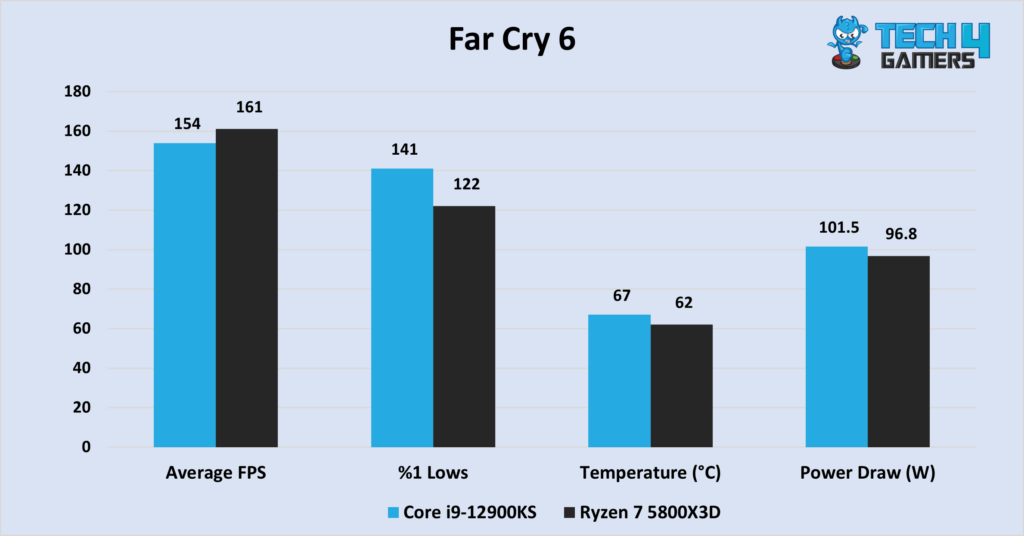
- The Ryzen 7 5800X3D averages 161 FPS compared to the Core i9-12900KS, which scores 154 FPS.
- Again, the i9-12900KS turns the tables in terms of the %1 low figures, recording 141 FPS. The Ryzen 7 5800X3D scores 122 FPS.
- Coming to the thermal performance, Intel’s i9-12900KS is averaging 67°C of heat in this test. The Ryzen 7 5800X3D is more efficient, running at 62°C.
- Here, the power consumption figures are comparable. The Ryzen 7 5800X3D consumes around 96.8 watts of power, and the Core i9-12900KS averages 101.5 watts.
Assassin’s Creed: Valhalla
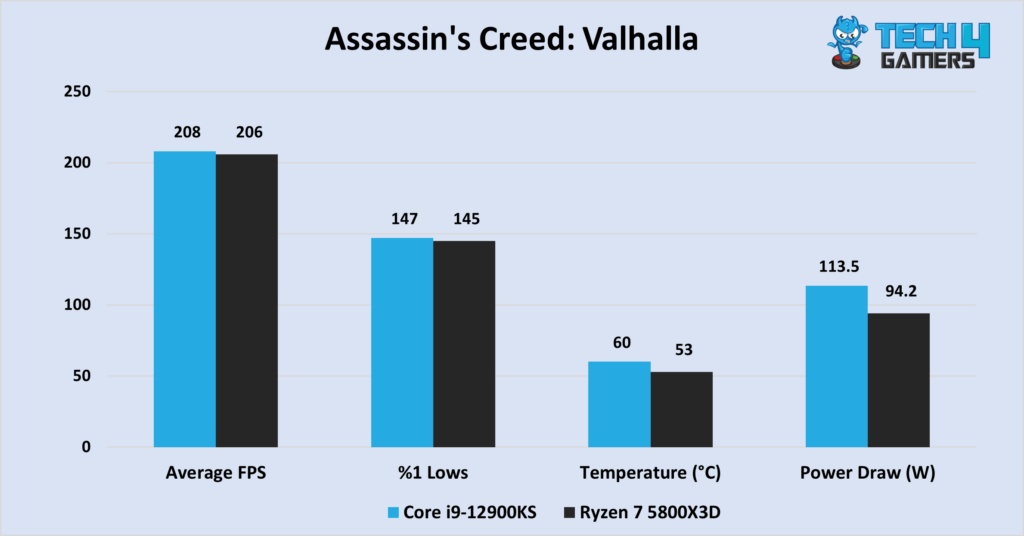
- Yet again, the two CPUs show similar performance. The i9-12900KS average 208 FPS compared to the 206 FPS of the Ryzen 7 5800X3D.
- The i9-12900KS scores 147 FPS when it comes to the %1 low. The Ryzen 7 5800X3D trails just behind with 145 FPS.
- The Ryzen 7 5800X3D runs at a very cool 53°C! On the other hand, Intel’s Core i9-12900KS runs at around 60°C.
- Familiar results in terms of power consumption – the i9-12900KS draws 113.5 watts which is 20.4% higher than the Ryzen 7 5800X3D’s consumption.
Also Read: Ryzen 7 5800X3D vs Ryzen 9 5900X
Horizon Zero Dawn
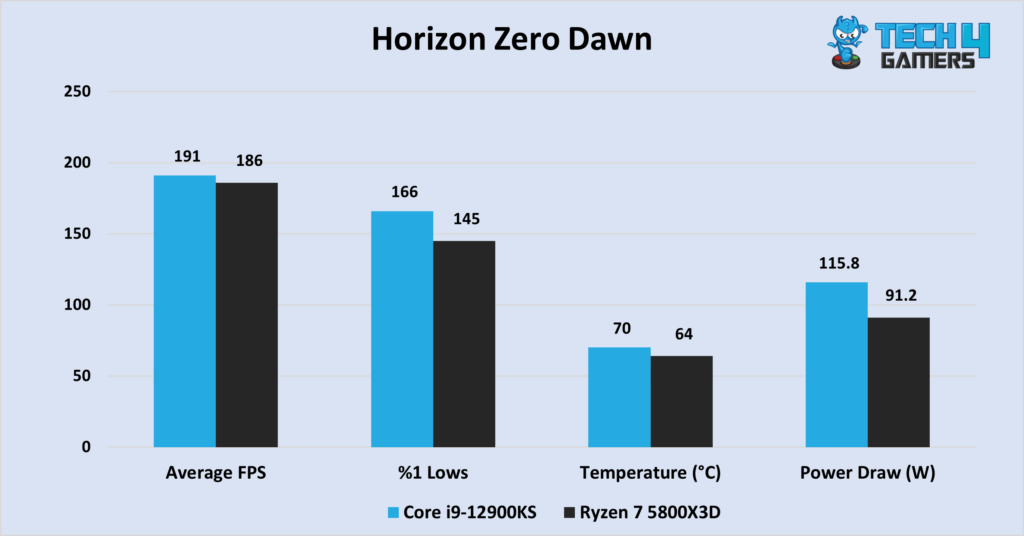
- The Core i9-12900KS averages 191 FPS in Horizon Zero Dawn. The Ryzen 7 5800X3D fights back with 186 FPS.
- In terms of the %1 lows, the i9-12900KS is 14.4% faster than its AMD Ryzen competitor.
- The i9-12900KS hits the 70°C mark in this test while the Ryzen 7 5800X3D maintains its superior thermal efficiency averages at 64°C.
- Intel’s Core i9-12900KS draws 115.8 watts which is 27% higher than the Ryzen 7 5800X3D.
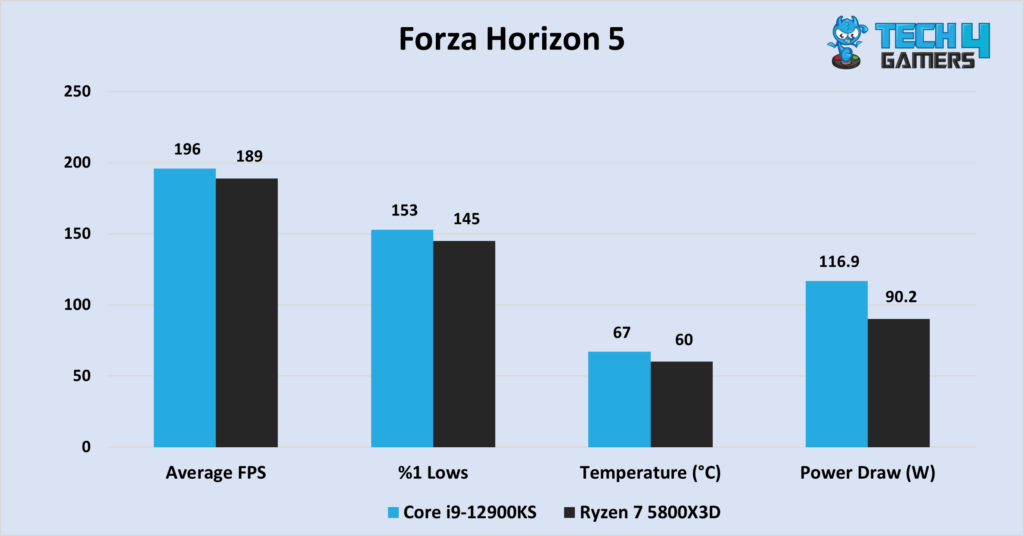
- The i9-12900KS takes another marginal lead in Forza Horizon 5, with 196 FPS on average. The Ryzen 7 5800X3D scores 189 FPS in reply.
- The Ryzen 7 5800X3D manages 145 FPS as far as the %1 low score is concerned. The i9-12900KS scores 153 FPS.
- Looking at the thermal statistics, the i9-12900KS runs at 67°C – 11.6% warmer than the Ryzen 7 chip.
- Another loss for the i9-12900KS as it draws around 116.9 watts while the Ryzen 7 5800X3D draws only 90.2 watts.
Overall Gaming Performance
Let’s look at the overall performance figures from the 7 tests that we did for our Core i9-12900KS vs Ryzen 7 5800X3D comparison. For that, we’ve averaged out the performance across all the benchmarks.
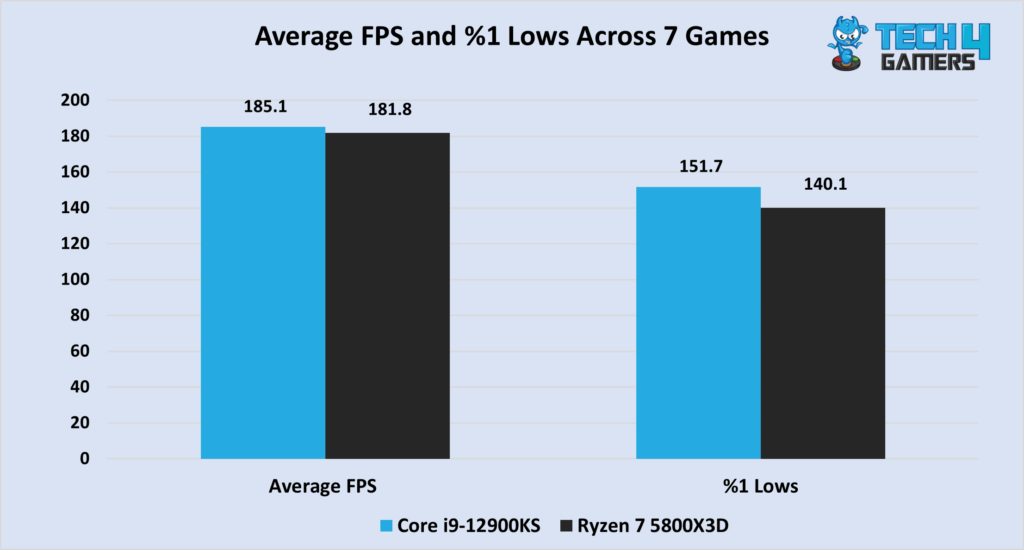
- The i9-12900KS averages 185.1 FPS across the 7 tests, while the AMD Ryzen 7 5800X3D averages 181.8 FPS.
- The i9-12900KS is, therefore, 1.8% faster than the Ryzen 7 5800X3D in 1080P gaming.
- In terms of the %1 lows, the i9-12900KS scores 151.7 FPS and the Ryzen 7 5800X3D recorded 140.1 FPS. Thus, the i9-12900KS has a bigger lead here at 8.2%.
Average Power Consumption
Next, here’s a look at the average power drawn by each CPU across the 7 games. Remember that the i9-12900KS has a TDP rating of 150 watts, and the Ryzen 7 5800X3D is rated at 105 watts. (42.8% higher)
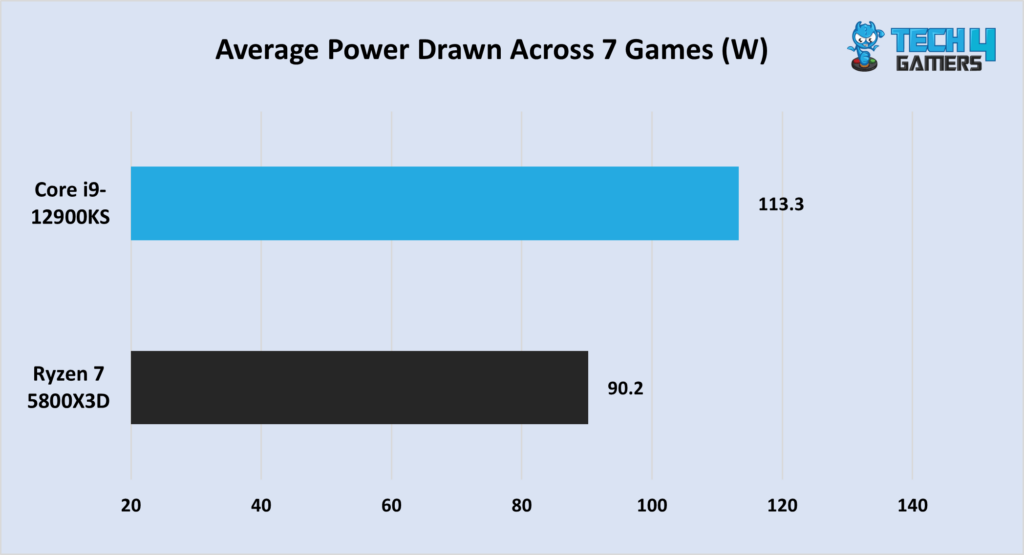
- The i9-12900KS averaged 113.3 watts of power consumption across the 7 benchmarks. In comparison, the Ryzen 7 5800X3D drew 90.2 watts of power.
- Consequently, the Ryzen 7 5800X3D is 25.6% more power efficient than the Core i9-12900KS in 1080P gaming.
- Both the CPUs were fairly underutilized in 1080P gaming, drawing much less than their TDP ratings.
Read more about the Concept of TDP.
Average Thermal Performance
Let’s look at the thermal performance of the Core i9-12900KS vs Ryzen 7 5800X3D by averaging their temperatures across the 7 tests. We can expect the Ryzen 7 5800X3D to be the better performer as it drew less power.
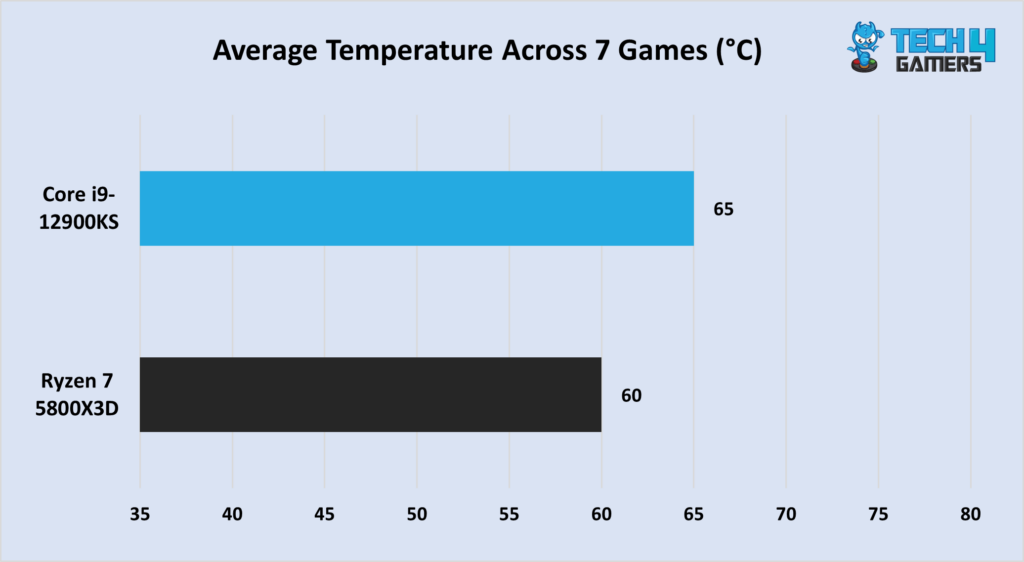
- Intel’s Core i9-12900KS ran at 65°C on average. As for the Ryzen 7 5800X3D, it ran much cooler at 60°C.
- Thus, the benchmarks have shown us that the Ryzen 7 5800X3D is 8.3% more thermally efficient in 1080P gaming.
Also Check: i9-12900K vs Ryzen 7-5800X3D [Gaming Benchmarks]
CPU, Power, And Platform Costs
The Core i9-12900KS launched with an MSRP of $819-$829. On the other hand, the Ryzen 7 5800X3D was released for $449.
In terms of platform costs, both the CPUs are nearly equivalent. The Ryzen 7 5800X3D is compatible with AMD’s 300, 400, and 500 series chipsets. The motherboards for these chipsets can be found for as low as $75. For the i9-12900KS, a supporting B660 series motherboard can be found for $82 at the minimum, and H610 motherboards are even slightly cheaper. You can read more on the overall cost of building a PC in our guide.
Both CPUs support DDR4 memory, but the i9-12900KS also supports DDR5 memory. Should you choose the slightly more expensive DDR5, you’ll be set back a bit more on your wallet.
The Core i9-12900KS has a 42.8% higher base TDP rating than the Ryzen 7 5800X3D and drew 25.6% more power during the 1080P benchmarks. Moreover, it has an absurd boost TDP rating of 251 watts. If you throw more intensive workloads at it or choose to overclock it, you should be ready to pay those electricity bills.
Upgradability
One final point that should be noted is upgradability. If you opt for the Core i9-12900KS, you also have the option to upgrade to a 13th-generation CPU, as they use the same socket and chipsets. Furthermore, DDR4 support is continued. The Ryzen 7 5800X3D is AMD’s last CPU for the AM4 socket and does not support an upgrade to the Ryzen 7000 series CPUs as it uses the AM5 socket.
Final Thoughts
The Ryzen 7 5800X3D and Intel i9-12900KS from AMD and Intel are the fastest CPUs of their respective generations. Both CPUs perform excellently in 1080P gaming but have plenty of differences in terms of specifications and other performance factors.
To choose between the two CPUs, you should consider more than their gaming performance. As we’ve discussed, there are plenty of differences between them, and you should take note of all of them before making a choice. In any case, we hope we’ve helped you greatly with our Core i9-12900KS vs Ryzen 7 5800X3D comparison. Before leaving, make sure to give our Intel i9-12900K vs i9-12900KS comparison a read as well.
Frequently Asked Questions
The Ryzen 7 5800X3D is only 1.8% slower than the i9-12900KS in 1080P gaming. It is also better in terms of thermal and power efficiency.
Yes. The Core i9-12900KS has support for both DDR4 and DDR5 memory. You only need to make sure you get a DDR4-supporting motherboard.
No. The Ryzen 7 5800X3D does not have integrated graphics and requires a dedicated graphics card.
Thank you! Please share your positive feedback. 🔋
How could we improve this post? Please Help us. 😔
[Comparisons Expert]
Abdemanaf is a skilled creative writer who has been honing his craft since 2011. While initially working in different fields, he found a passion for technology and has been exploring the tech world since early 2015. Over the years, he has developed an in-depth knowledge of the latest tech trends and product offerings by various companies.
Abdemanaf’s writing reflects his analytical mindset and ability to think critically. He has a knack for breaking down complex technical information into easily digestible pieces, making his articles engaging and accessible to readers from all backgrounds. In February 2022, he joined Tech4Gamers as a blog and product comparison writer, where he has been able to hone his skills further.
As a writer, Abdemanaf is dedicated to staying up-to-date with the latest technological advancements and trends, enabling him to provide readers with the most relevant and accurate information. He is always eager to learn more and is constantly seeking new challenges to improve his skills.
Get In Touch: [email protected]


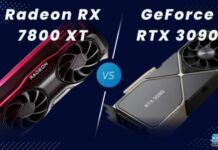
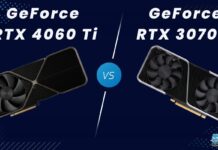
![Core i5-13400 Vs Ryzen 5 7600 [We Tested 9 Games] Core i5-13400 Vs Ryzen 5 7600](https://tech4gamers.com/wp-content/uploads/2023/04/Comparison-1-218x150.jpg)
![RTX 4070 Ti Vs RTX 3080 Ti [Gaming Benchmarks + Overall]](https://tech4gamers.com/wp-content/uploads/2023/01/RTX-4070-TI-VS-3TX-3080-TI-218x150.jpg)
